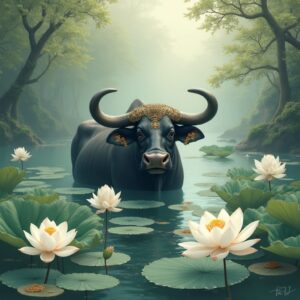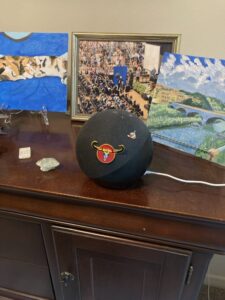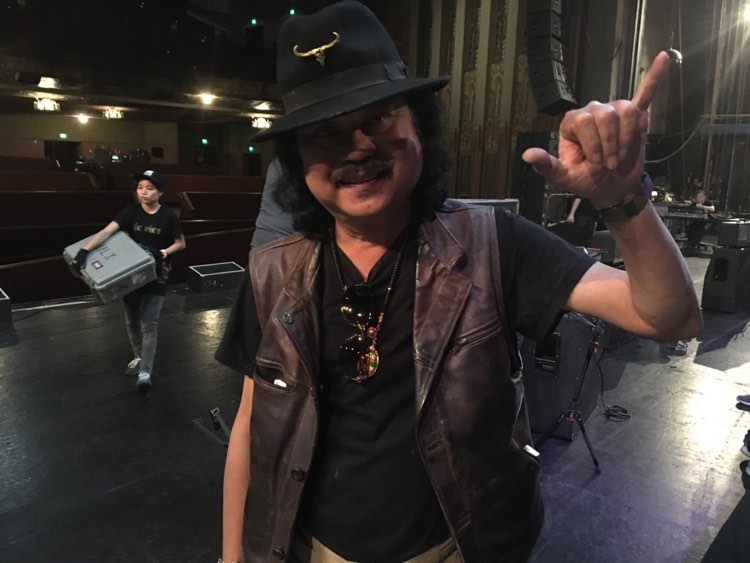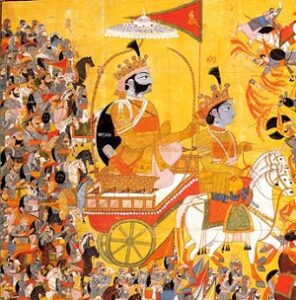Composer/Lyrics: สุรพล สมบัติเจริญ Suraphol Sombatcharoen
From the album 95 ปี ราชาเพลงลูกทุ่ง สุรพล สมบัติเจริญ “95 Birthday of the King of Luk Tueng Suraphol Sombatcharoen,” a special tribute album for Surapol Sombatcharoen, who would be 95, if he were still alive (2025)
Lead Vocal : ยืนยง โอภากุล, Yuenyong Opakul
NOTE: There are two meanings of the word แฟน “faen” in Thai, which is a borrowing of the word “fan” from English. The primary meaning of แฟน “faen” is boyfriend/girlfriend/husband/wife. It’s a very nice, respectful, gender neutral solution to describing your lover, which I wish we could borrow back from Thai into English. The SECONDARY meaning of แฟน “faen” is the same as English, like a fan of a singer or movie star. It fact, to avoid confusion, in Thai, it is much safer to say that you are a แฟนคลับ (faenklap) “fanclub” of some singer or movie star, so as not to sound like you are claiming you are their boyfriend/girlfriend/ husband/wife. So keep in mind the two meanings of “fan” as you listen to this song. Also “ja” (from the title) is a particle like “ka” but is sweeter and implies more intimacy.
ลืม ผมหรือยังครับแฟน
Fan, have you forgotten me, or not yet?
เมื่อก่อนเคยฟังกันแน่น
Formerly you all crowed around to listen
แฟนจ๋าแฟนลืมผมหรือยัง
Fan, have you forgotten me,
จากไปเสียนาน ตั้งแต่เลิกจัดรายการให้ฟัง
from long ago, after I quit doing that [radio] show for [you] to listen to?
คงลืมผมเสียแล้วกระมัง
Perhaps you’ve forgotten me already.
ลืมหรือยังหรือยังครับแฟน
Have you forgotten me, or not yet, fan.
ลืม ผมหรือยังครับคุณ
Have you forgotten me,
เมื่อก่อนเคยหมุนฟังคลื่น
in the past when [you] used to turn [the dial] and listen to the [radio]waves,
วันและคืนฟังเพลงสุขแสน
day and night listening to songs so happily?
ผมจัดรายการเมื่อก่อนคุณฟัง ครั้งอยู่ต่างแดน
Back then, I put on a [radio] show for you to listen while in a different land*
คุณจดหมายไปกันเนืองแน่น
You wrote me a lot of letters,
สมัครเป็นแฟนผมยังไม่ลืม
applying to be a fan, I still haven’t forgotten.
ลืม ผมหมดแล้วหรือคุณ
Have you completely forgotten by now?
ลืมพวงมาลัยหอมกรุ่น
Have you forgotten the fragrant garland of flowers
ที่คุณคล้องคอ ผมรอใจปลื้ม
you looped around my neck. I waited delighted.
วัดสนามชัย ดินแดนครั้งก่อน ผมยังไม่ลืม
at Wat Sanamchai [Field of Victory Temple], in a land of the past. I still don’t forget.
ผมหลั่งน้ำตาอุราแสนปลื้ม
I cried happy tears
ลืมแล้วหรือภาพแห่งความหลัง
Have you forgotten by now, this picture of the past?
ลืม ผมลงคอหรือแฟน
[You’ve] forgotten. Have I done something terrible, fan?
อย่าพึ่งลืมมิตรแสนซื่อ
Don’t just suddenly forget this honest friend.
คือผมนี่ปรานีอีกครั้ง
It’s me here. Be merciful one more time.
ผมจัดรายการรีบหมุนคลื่นเถิด เปิดเครื่องรับฟัง
I’ll do another show. Quickly turn to the wave[length]. Turn on your radio, and hear it**
กลับเถิดนะ กลับใจอีกครั้ง
Come back! Change your mind [and come back] again.
กลับมารับฟัง เหมือนเดิมเถิดคุณ
You [honored one]***, come back and listen like before.
*An expert translator says in this case, ต่างแดน = ต่างจังหวัด (another land = another province) and the choice of the word แดน (land) was forced by the rhyme.
**It actually says “turn on your machine,” but in the context it is almost certainly a radio
***This is a medium-level respectful word for “you.” (In Thai, there are many alternative words for “you.” This one is commonly used and is the same as the word for “value.”) I wanted to specify, because “You, do something!” in English sounds mildly disrespectful.

 Below are my Facebook posts about Carabao and the show #WhiteLotus, season 3. I haven’t edited anything, only added hyperlinks to the songs.
Below are my Facebook posts about Carabao and the show #WhiteLotus, season 3. I haven’t edited anything, only added hyperlinks to the songs.



